一路平安。Safe travels!
— Chinese idiom.
I’m headed to China! 再見!
一路平安。Safe travels!
— Chinese idiom.
I’m headed to China! 再見!
It’s official! I have now finally completed the Fall semester portion of my program! I am elated to be able to take a bit of a breather from all the formal schoolwork. I have definitely noticed that my Chinese has improved quite a bit from all of the writing and presentations that this program requires but there is still a lot of work to be done in order to reach the final goal of this program, which is receiving a Superior on the Oral Proficiency Interview exam administered at the culmination of this program. I plan to continue improving my Chinese on a daily basis in the second half of this program in the same manner that I did during the first half in order to utilize this unique immersion opportunity as best as I can.
The Chinese New Year is also fast approaching, and this holiday is a much bigger event than celebrating the New Year back home or even Christmas. One big difference is that on this holiday, many families return to their hometowns no matter where they are located in the country. This affects many businesses and tourist sites as many of them are closed. But this isn’t just a day or two of celebrations, but rather celebrating the Chinese New Year continues for two full weeks! I can’t think of any official holiday back home where we get this much time off and I have personally been affected by this long break period. Ever since I stumbled upon a famous lamp soup shop in my area, I have been eating breakfast there faithfully every morning for almost three months. And yes, it’s that good! Having to endure the reality that they will be missing in action for two full weeks has been quite the challenge!

In class, we learned the story of the Chinese New Year. The story goes that every winter a ferocious monster named Nian would visit villages in ancient China and eat the residents since the food in the mountain was scare. But one year during one of Nian’s attacks, the villagers accidentally dropped some bamboo in a fire. The bamboo began to explode loudly, and this scared Nian away. After that, the villagers realized that Nian was afraid of three things–the color red, fire, and loud sounds. From then on, the practice of setting off fireworks was done every year in winter to ward off evil spirits and this is tradition that has continued to this very day.
I will say though, that the celebration of the Chinese New Year is a much family-oriented than back home. On New Year’s Day in Hawaii, there are fireworks all over the city in every neighborhood almost as if there is a contest to see who can put on the most ostentatious show. Here in Nanjing, at least, it has been extremely quiet and I don’t think I have seen any public celebrations anywhere. All the celebrations are taking place on a smaller scale in everyone’s hometown as opposed to the grand community celebrations carried out back home. I look forward to a prosperous Year of the Rat!
The end of the Spring semester here in Nanjing is finally upon us! We have been hard at work for the past couple of weeks getting ready for our final exams as well as writing final essays for different classes. It has been very hectic, and the time has just been flying by! We had a debate as one of our final speaking tests for one of my Chinese classes and the topic was “Should people live for themselves, or should they live for others”. It was a good experience to really dive into the language on many different levels at the various stages of preparation for the final debate. Philosophizing in another language can get really complex pretty quickly but it’s something that we all realize must be done to really take one’s command of the language to the next level. I am grateful for the experience no matter how stressful it was altogether.
There is a community outreach portion of the program I am participating in and it requires all students to volunteer time in the community for at least ten hours before the Fall semester ends. For my outreach project, I participated in a New Year’s day celebration that was held in a rural area outside of the city in a place called “Shitang Village”. I found the coordinator for this event through a random WeChat group I stumbled into. After exchanging pleasantries, the coordinator put me to work pretty quickly before the event even started. She put me in charge of a group of foreign students from our university that were participating in the event via another association on campus. This experience gave me a taste of what it would be like to work as some sort of coordinator in the tourism industry back home in Hawaii or even as a translator for an international company here in China.
On the day of the event, I was very nervous since I was the person in charge of transportation from both the Gulou campus and the Xianlin campus. I had to arrive at the pickup location on campus early so no-one would get lost as well as check in with the Xianlin group to ensure everything was going smoothly. Everything went well for the most part except for a number of no-shows. When we arrived at the event site, we were greeted with a lion dance group that was making its way through town and had coincidentally passed right by our group. It was a great way to start the day!
From there on, the other students made their way to the various cultural booths that were setup to get a taste of traditional and rural Chinese culture while I was put to work. This time, I was assigned to a food booth stall making a traditional food that is always eaten during the New Year celebrations in the south –New Year cake. I thoroughly enjoyed this and during my shift, I had fun interacting with the guests that visited us during the event. They were very surprised to see a foreign face not only visiting but actually working at the event! I was interviewed twice during the day by the local news station with cameras and everything. I felt like a star for the day even though I was working.
It was so nice to get out of the city proper and enjoy the countryside a bit. The air was fresh, and the people were warm. They gave me a taste of their local homemade rice wine which was the first type of wine I’ve tasted that wasn’t bitter at all. It was quite sweet, but the locals warned me not to drink too much as it is easy to get very drunk on that wine without noticing it. At the end of the day, they made sure I didn’t go home emptyhanded and gave me a bag of goodies filled with their local specialties to remember them by. I look forward to more excursions like this in the new year!

Last week, I went to a museum called the Imperial Exam museum. This is quite an interesting museum that tells the story of the imperial examination in China. This is a very old exam that started during the Sui dynasty around 581 and lasted for hundreds of years until it was abolished around 1911 in the Qing dynasty. This exam was given every three years and had a total of four parts to it. Passing this exam was a requirement to becoming a state official in ancient China and the reason for exam was to ensure that all state officials shared a common knowledge of writing, the classics, and literary style.
I thought I had it hard trying to learn Chinese and its thousands of characters, but this is nothing compared to what students had to endure then. The students back then had to memorize ten entire books! And these weren’t just ordinary books, they were very thick literary books that taught the classics and the students had to know all the contents of each book by heart with no hesitation. Not only that, their penmanship also had to be exquisite and absolutely perfect. One of our teachers mentioned that many famous people in the China’s long history never managed to pass this exam failing not once but many times over many years. Examples include the author of the famous story, “Journey to the West” Wu Cheng-en, the author of China’s definitive text on traditional Chinese medicine, Li Shizhen as well as the revolutionary leader Sun Zhongshan.


It was hard to imagine taking such an important exam in such an uncomfortable environment. The tests were given in what seemed to be very small cubicles with a small thick slab of wood that was the desk and also served a double purpose as the place where the examinees slept. Our teacher mentioned that the test was so strict that every single person desiring to take the exam had to go through an extensive body search before being allowed to enter the testing area. This included a cavity search as well to not only ensure there no cheating but also to ensure that only men took the test since women would try dress as males to try their hand at the test. If someone was caught cheating, the punishment was very harsh. One example our teacher gave us was an official rigging the system to favor candidates from his hometown. The large imbalance regarding province representation gave him away and he was ultimately banished to the frontier but the punishment for the lower individuals that helped him cheat was to be dismembered. The Chinese have a saying, “Knowledge changes your fate” and after visiting this museum I totally understand why education is so important here.
Besides this, Christmas is almost here in Nanjing and it is strange not being at home for the holidays, but there is some holiday cheer here in China. I assumed that no-one would celebrate this holiday but I have seen Christmas decorations at a number of places throughout my day such as my apartment complex, a few restaurants, and my school. I warmly welcome this, since this makes it a bit easier to get through the holidays away from home.
This week I was able to undo a misconception I had about China. In my elective class about the history of Mongolia, our teacher was giving his lecture as usual and was explaining to us in-depth about complex history that the Mongol dynasty has in China. Their dynasty was the only dynasty in China’s very long history to be ruled by an ethnic minority. I have been told by many of my professors here in China and at my university back home that the dominant ethnic makeup in China is the Han people. With this in mind and considering the issue of censorship in China, I always assumed that there would be a specific narrative given that teachers would not be allowed to deviate from. Because of this, I was completely shocked when my professor paused in the middle of his lecture and told us frankly that who knows what is true when it comes to history. He emphasized that what he is teaching us now is what is accepted as how history played out according to the collaborations of historians and experts in this field but history is always subject to change as more new information is found. Granted, the history of the Ming dynasty is not a particularly sensitive topic in China, but it is good to know that the learning system here is not as dogmatic as I once thought it was.
On Friday, I went to a live opera demonstration with my class at the Nanjing Baiju cultural center. Baiju is a folk art that draws its origins from the famous brocades that were made from the emperor in Nanjing. I wrote about this previously, and it includes at least two people make silk fabrics for the emperor and other nobility in ancient China. Because of the complexity of this art, a day of labor yielded only make a very small piece of fabric which meant each complete brocade piece would take on average at least three years to make. During this time, the workers would be very bored and tired of doing the same mind-numbing work day in and day out. The pay was low and conditions were poor, so to help pass the time and at the same time relieve some stress, they created Baiju.
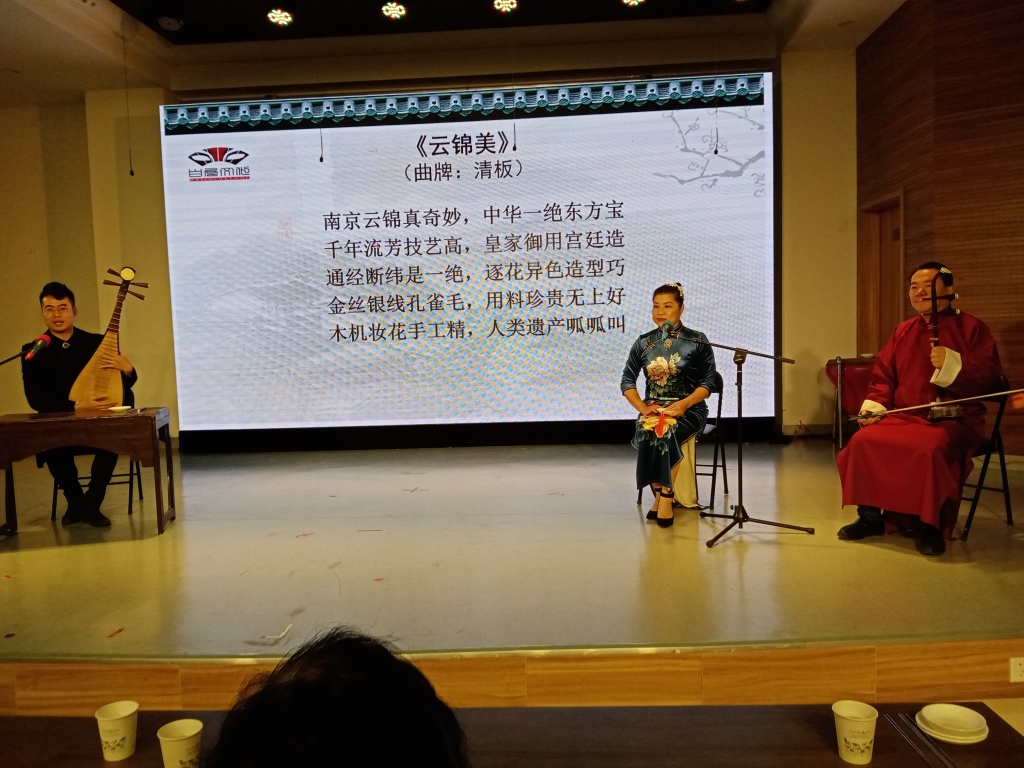
Baiju is a form of singing that combines talking and singing where one worker would talk and the other would sing. Sometimes the song composition would be a simple dialogue, and other times it would be a question and answer conversation. These songs would include the workers complaining about their boss, and low pay as well as including everyday topics like Nanjing specialties, local scenery and even romance. I thoroughly enjoyed experiencing this artform in-person, and it was interesting to see how the art form has changed given the rapid development that China is experiencing. The cultural center showed us a video about how Baiju is portrayed in contemporary China and there are many changes from the original art form. I think change is good, and it can breathe new life into an ancient art form to make it more appealing to the younger, more global generation. I look forward to learning more about Baiju and perhaps actually see an actual full show with my classmates.
This past week we had a class field trip to two very famous sites in China. The first was the Nanjing Yun Brocade Museum of China. This museum is in a class of its own being the only museum in China that showcases the ethnic art of brocade or silk fabrics with colored patterns. This traditional handicraft began at the end of the Eastern Jin dynasty around 420AD and was initially only to be used by the royalty of the times. If commoners would dare to wear it then that would be a certain death sentence. This goes along with the social hierarchy of the times where there had to distinctive differences between the ruling class and everyone else, although there were brocades that made for military personnel as well.
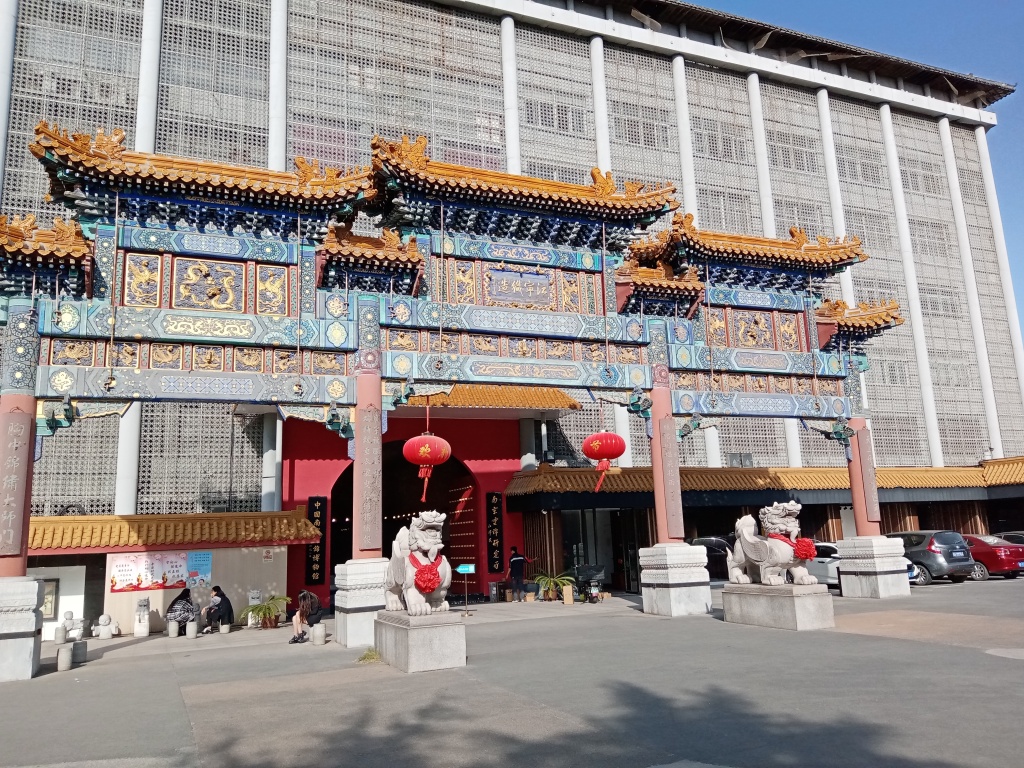



As is evident in the pictures included in this post, these silk fabrics are works of art and are very time-consuming to make. At the very least, two people are needed to make a brocade. One person is positioned at the top of the weaving machine and that person feeds the weaving apparatus the fabric used to make brocade. Our teacher informed us that this is the “easy” part and that the person below is the one who really has their hands full. The individual working the bottom portion of the machine is responsible for the beautiful and complex designs that these silk brocades are famous for. These brocades are very expensive with some of the full wall mounts worth over a million dollars. I asked my teacher if there was any way that we could learn this ancient art by volunteering or interning at that particular museum but our teacher told us that the fabrication of brocades at this particular museum is a national secret that foreigners are not allowed to learn. This museum is the same museum that provided garments to dynasties throughout China’s long history so I can understand the sacredness of this location.
The second place we visited was the Memorial Hall of the Victims of the Nanjing Massacre by Japanese Invaders. This museum pays tribute to the thousands of Chinese who lost their lives during the Nanjing Massacre that started in 1937. These was a difficult museum to visit, because seeing all the horrific things that happened to China during this dark period in their history was heartbreaking. I thought the museum was very well done with dirt from different areas where the massacre occurred as well as a huge actual plot of land from the massacre site was also on display. This piece of land was undisturbed and the skeletal remains of the victims of the massacre were all still visible as a reminder to the Chinese people to stay vigilant and continue the development of China. I was especially happy to see the last monument before departing the museum which was a picturesque statue that had the words “Peace” inscribed on it. Our never-ending goal for the world should ultimately be peace for all.

This past week wraps up almost two weeks of nonstop midterm testing. It has been very stressful and had many of us pushing on with very little sleep, but it has been a good learning process to go through the struggle of midterm exams in China with my Chinese classmates. The testing process seems very similar to what one would expect back home and there were no real surprises during testing; some were writing essays and others were speaking focused activities to assess our language proficiency gains made during the last two months we’ve been studying Chinese. I have my last midterm exam this week so it will be great to finally have a break and rest for a change.
For most students though, today marks the culmination of their midterm testing, so our program held an internship session for us at a company where one of the students from last semester’s cohort is currently interning at. This company is called Covey Education, which is the motivational company started by the late author of the highly acclaimed bestseller, “The Seven Habits of Highly Effective People”, Stephen Covey. I remember reading this book as a part of a class I had to a few years ago and I recall it being full of useful information that, along with all the material my professor teach me in that class, helped me to form effective study habits. I never foresaw myself actually getting this up close and personal with the company.

It was insightful to see how the ideas I had come to know this book for expressed in a Chinese context and in China no less. A few speakers from the company gave us a few short presentations on their work and for the most part, the content that was presented did seem to be in-line with what I remember learning in class however there was at least one difference that I noticed. This difference pertained to the great emphasis that is placed on education in China and how everyone needs to have balance in their life. There was great emphasis placed on the need to devote time to develop leadership qualities because, as the representative explained to us, everyone can be a leader with effort and guidance.

It was exciting to see one of our own classmates making great strides in a Chinese work environment with the friends that he had made among his coworkers and on top of that delivering presentations completely in Chinese while comfortably interacting with us and his Chinese team. We were all very excited for him and eager to emulate the obvious success he has achieved with his internship provider. As our cohort moves closer to the internship portion, many of us are making plans to visit different areas of China for interviews and to move forward with the process of securing an internship. This is the second portion of our program where we are required to spend four months at an internship where we can take all the Chinese that we have gained in the classroom and put it to good use in a professional setting. It is exciting and nerve-racking at the same time but after today’s presentation, we are all ready to face this internship challenge head on!
Last weekend, when I riding my bike on the way home from lunch, I came across the scene of a minor car accident. The accident was between two middle aged men, one of them drove a minivan and the other was a taxi driver. Even before I pedaled up to the scene, the voices of the two men discussing things amongst themselves were audible from far off. A crowd had gathered, and they too joined in the deliberations. There was a sole policeman amongst them, but he didn’t say much at all and just seemed to be monitoring the situation. The regional accents from both men came out in full force and it was a bit difficult to follow exactly what they were saying, but I did manage to get a general idea of what was transpiring, and the outcome was much different than what would occur in the west.
Apparently, the crowd joined in and started voicing their opinion because they were encouraging the minivan driver to settle matters with the cab driver in cash. In the end, the van driver gave the cab driver what seemed to be 300 RMB (~$42) and they both went their separate ways. I’ve been told that many laws here in China are like guidelines to be loosely followed and I guess this was a good example. Everything seemingly worked out fine and the police were on-site to ensure no-one was hurt.
Last week, we went on a cultural excursion with our entire cohort to visit a historical site that is not only famous in Nanjing but is also well known throughout the entire country. This site is the Ming Xiaoling mausoleum at Purple Mountain. This site is where the founding emperor of the Ming dynasty, Zhu Yuanzhang is buried as well as the first ruler of the Republic of China, Sun Yat-sen. There are also many famous rulers throughout China’s very long history that have been buried here. They all chose this location because within the idea of Fengshui, this location is very ideal. Where the tombs are located, there is a mountain in the rear and water in the front as well as amazing views of the entire city.
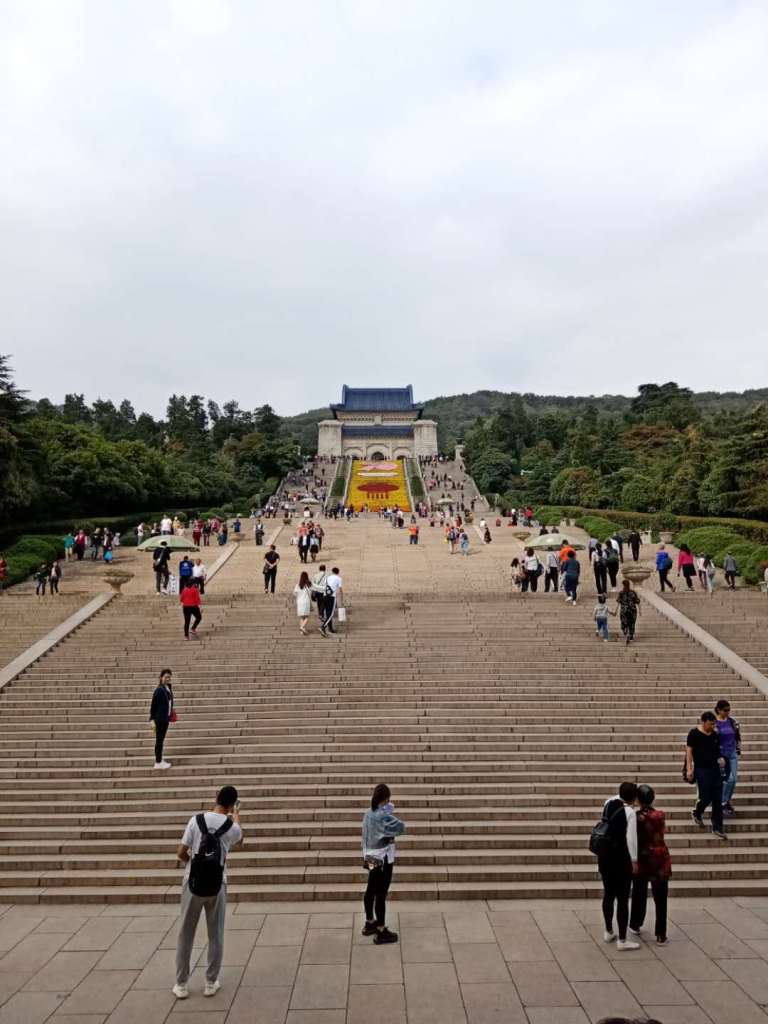
Ancient rulers believed in ensuring that their life after they died would mirror their life on earth. Before visiting here, I haven’t heard of this way of viewing death. Therefore, they would build very large and extravagant mansion underground that matched or even surpassed the mansions they enjoyed above ground. These mansions would sometimes take over 20 years to build and were full of precious belongings and valuables. People close to the rulers would also be included with this process, so when they the ruler died, all of his concubines would be killed and buried with him. In the tomb of one ruler that our teacher mentioned, the remains of over 40 concubines was found. And here I thought some of the very rich individuals in modern society were wasteful, it could be much worse obviously.

On one hand, this is a practical way of viewing death, that doesn’t include any extremes of a perfect utopia like heaven or eternal damnation like hell, rather whatever one sets up for themselves while on earth will be what they have available to them when they die. It is simply crossing from one realm to another. On the other hand though, what about everyone else that isn’t privileged enough to have been born into nobility. At any rate, it is very insightful to get a glimpse of how different cultures view something that everyone must face some point.
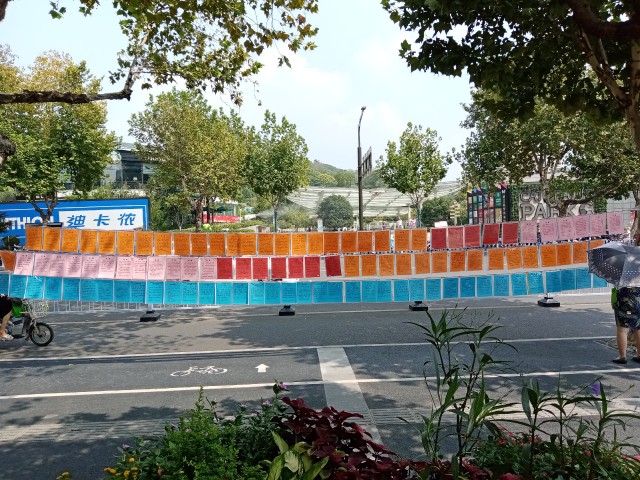
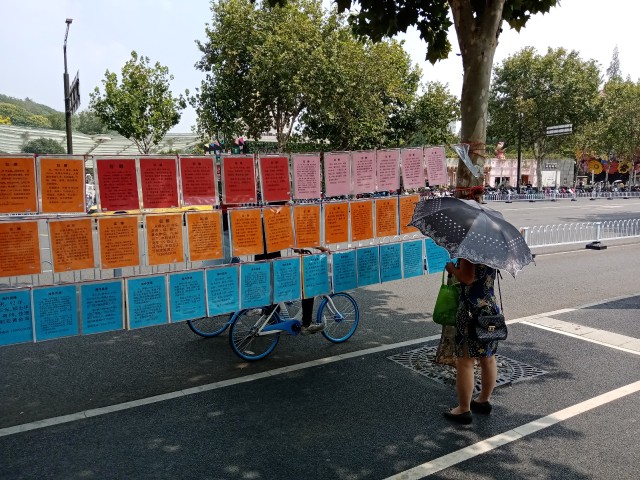
I was taking a stroll in a park one day after getting lunch and I noticed the above postings. These are marriage advertisements that parents have posted for their single children. The majority of these personals seem to be for single women but there are also single men postings as well. This seems kind of similar to the personals section that used to be commonly seen in different newspapers in the United States however I don’t remember having seen them for many years in the newspapers in Hawaii.
I spoke with a local perusing the personals and I also asked around at my school about this issue. Many people have difficulty locating a spouse for one reason or another. A prominent issue is there are a number of unwritten requirements that are expected to be fulfilled in order to get married. These include things commonly expected in many cultures including our culture in the USA, such as the groom having a stable job, transportation, a good educational background. However, there are also additional requirements such as already having a home and having the proper hukou. The hukou system is a type of family registration program that outlines benefits and privileges afforded to families based on the geographic location within the country. This is an extremely important factor in finding an ideal marriage partner because having a hukou in a big city like Shanghai or Beijing increases the chances of being successful in the future for any future children a couple may have. Some news reports that I have watched even stated that for many residents, the single most important factor for choosing a spouse is the location of their hukou. Everything else comes second to this.
A lot of different information is written on the personals ad including educational background, career information, whether one owns a house and/or car, age, height, weight, personality traits, horoscope, birthdate, etc. The youngest age I saw on that particular day was 23 and the oldest was 33 with the majority being between 24 and 29 yrs. old. On certain days, parents will actually meet up where the ads are posted to share even more information about their children. Matchmaking is a very traditional aspect of Chinese culture and is a very interesting topic to explore.

Last week, there was an event held at the Xianlin campus of my university where all the student organizations gathered together to disseminate information about their activities and recruit members. This particular campus is located pretty far away from where our main campus is (about an hour away by subway) but I was told that this event is only held once a year so I decided to wake up early that Saturday and make the trek there. This was a novel event for me as there were so many different and diverse clubs to choose from. There was everything from music clubs to sports clubs to video game clubs as well as debate, traditional Chinese attire, tea etc related clubs. I signed up for a number of clubs and I am very excited to make new friends and learn more about the different activities available here.
One thing that has really stood out to me here in Nanjing is how safe this place is for a city of its size. The most notable example of the city’s safety is the city’s take on storing bicycles in public. There is nothing to secure bicycles to and some don’t bother with using a lock, they just park their bicycles and go about their business. I’ve not heard of bicycle theft being an issue here, on the contrary, my teacher mentioned that Nanjing ranks as one of the top five safest cities in all of China. That is a very impressive statistic for this city, and I find it quite comfortable living in this type of environment. I recall in one particular assignment for my writing class, Xi Jinping was quoted in an article where he mentioned that if the country and nation are prosperous, then everyone will be taken care. In terms of public safety and crime, this sure seems to be case with Nanjing.

I learned this week that the famous Peking duck actually originated from here in Nanjing. Beijing has lacks the suitable environment for ducks that Nanjing has. However, presumably the famous dish carries Beijing’s name since it is the capital of the country. Even though Beijing is the current capitol of China, there are many times throughout history where Nanjing was considered the most important city. This history goes back over a thousand years to Eastern Wu during the Three Kingdoms period and includes contemporary periods as well as recent as the year 1949 before the People’s Republic of China was created. The duck here is eaten on its own without sauces required unlike the Peking duck served in the capital. Another important tidbit our teacher shared is that a local delicacy is duck butt. He urged us all to try it but be sure to reserve portions in advance since a duck only has one butt and it sells out very quickly. Wonderful!
This weekend is a long weekend and I really mean long. We have seven days off for the holiday commemorating the new establishment of China in 1949. This is a special year as it’s the 70 year anniversary of this holiday, so there is a lot going on all over the country, especially in Beijing but also locally here in Nanjing as well. For my program, besides the mountain of homework that we have every week, everyone is getting prepared for our internships next semester. This includes doing research on suitable internship sites, making contacts, sending out resumes, and making site visits as well to report to our director. One thing to note here is that since the holiday falls on a Tuesday, our schedule has been adjusted so that we have our Friday classes on Sunday and our Monday classes on Monday as usual. It feels strange to have class on Sunday since this is seen as a rest day back home but it isn’t just our program but rather all universities all over China are following this same schedule. Nevertheless, the atmosphere during this special holiday is quite festive and it is an exciting time and a great opportunity to learn more about China.
Today, I had a study session with my one-on-one teacher in my Chinese Writing class. It was our first meeting and I think it went well but the best part of this meeting was the conversation that we had afterwards. During our session, we covered many topics, but there was one topic that was captured my attention. This was the topic of “the left-behind children” in China. My teacher revealed to me that she was, in fact, a part of this group of children. To be accepted into this program that I am participating in, students have to take an advanced Chinese class that includes writing a 5000 word research thesis in Chinese. I did my thesis on this very topic, so I was extremely excited to finally meet someone who experienced this in their youth.
My teacher has an older sister who had heart problems as a child and to pay for her care, both of her parents had to move to Beijing to find better paying jobs. Her sister was moved to the house of my teacher’s uncle which was very far away from my teacher’s house in completely different city. Because of this, my teacher lived on her own from the age of eight until she was about 16 years old. She shared with me the details of her upbringing and it is an amazing story. She lived in their big family house all alone and cooked, cleaned, went to school, and pretty much raised herself all alone. She mentioned that during the earlier stages, her neighbors would check on her from time to time to make sure she was safe and bring her groceries but was mostly alone for those eight years. Her parents would come home to visit once a year during the Chinese New Year but that was it.
I was very curious what life was like for her as a child growing up and she mentioned that until the third grade, she was a very average student and didn’t care much for studying. But then, one day her parents had a serious heart-to-heart talk with her about her future and from that point on she became very focused on her studies and eventually was able to get accepted into and finish her bachelor’s degree and master’s degree at one of the top 10 universities in all of China. This is a subject of much discussion in China and I hope to learn more about it during my time here.
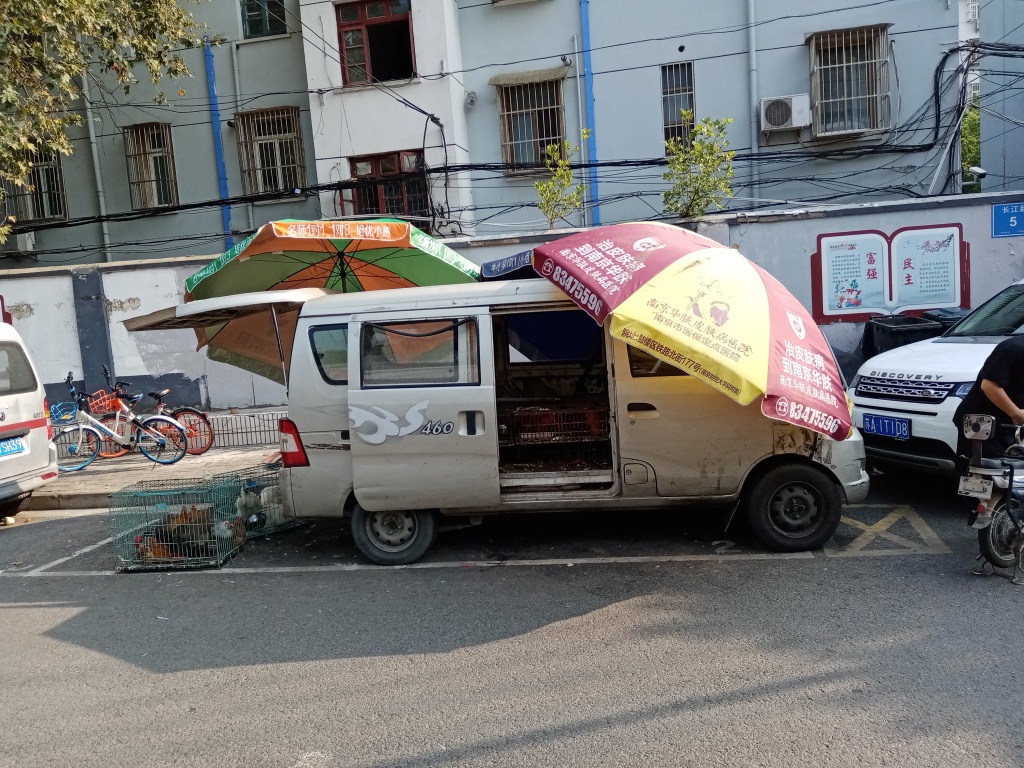
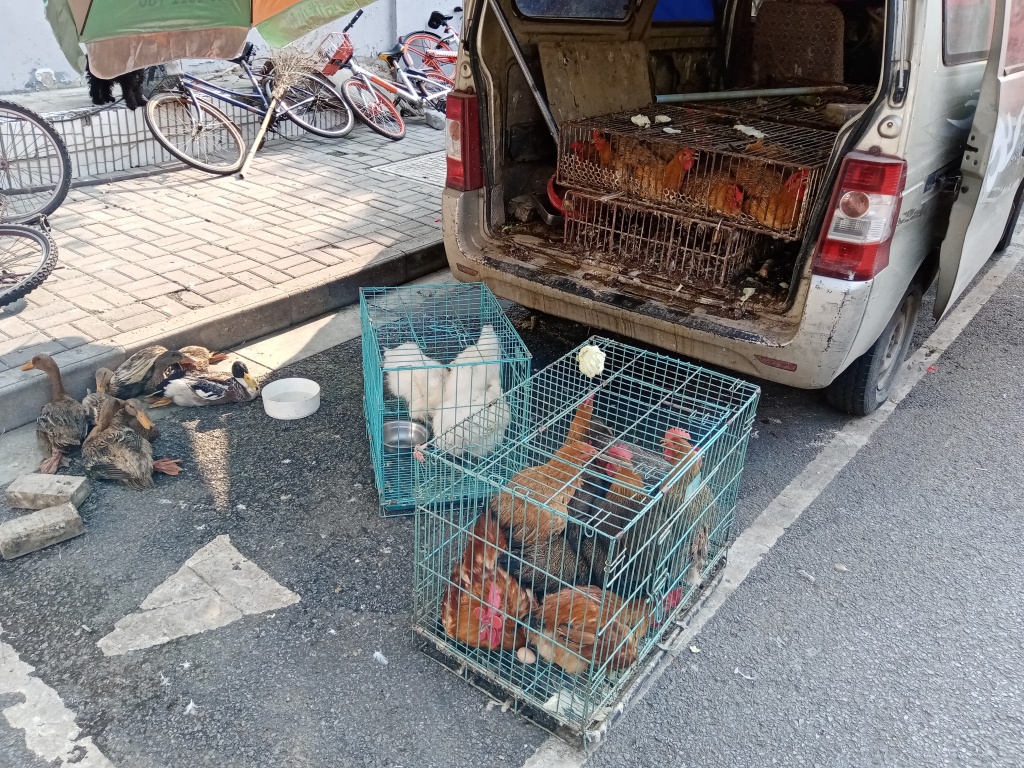
On another note, when I was on my way to eat lunch today, I saw a guy selling live animals on the street. I had a hunch that the chickens were going to be sold fresh and then taken somewhere else to be killed and processed. I was in for quite the surprise when I realized that the man that sold the chickens, ducks and pigeons was also the man that ran the little meat stall across from the truck. Then, along came some customers and the man went to get some chickens. He weighed them and then just ripped their heads off which really shocked me. This was my first time to see such a setup on the street, but this is probably about as fresh as it gets.